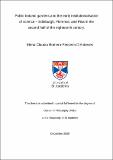Public botanic gardens and the early institutionalisation of science : Edinburgh, Florence, and Pisa in the second half of the eighteenth century
Abstract
This thesis is a comparative study of four botanic gardens in Scotland and Tuscany in the second half of the eighteenth century. Taking an approach based on case studies, it argues that botanic gardens were early examples of specialisation, professionalisation, and institutionalisation of science. The existing historiography on the topic has tended to focus on large and famous institutions which enjoyed excellent social and economic resources. By examining gardens at the margins of the largest Enlightenment science centres, the thesis shows that there were European trends in the evolution of botanical and scientific institutions at the time. Despite many differences in their political, economic, and climatic situations, the comparison of the botanic gardens of Edinburgh, Florence, and Pisa reveals striking similarities in their development as institutions in the second half of the century. The thesis explores three main themes: the management of space, the status of staff, and the place of the gardens in a wider public infrastructure. It shows that, though their responses to each theme sometimes differed, the gardens grappled with the same questions and followed similar trends. The space of the gardens was fashioned by and dedicated to scientific activities in a way that gave an increasingly precise definition to the concept of science, one that included research and excluded other forms of knowledge practices. The status of the people in charge of the gardens came to be more clearly defined and made them rare figures of professionals of science in the eighteenth century. Finally, an increase in funding and control by public authorities gave the gardens a mission to serve the public good through the practice of science. By examining these trends in all three cities, the thesis shows how specialisation, professionalisation and institutionalisation of science developed in botanic gardens of the eighteenth century.
Type
Thesis, PhD Doctor of Philosophy
Rights
Creative Commons Attribution-NonCommercial-NoDerivatives 4.0 International
http://creativecommons.org/licenses/by-nc-nd/4.0/
Collections
Except where otherwise noted within the work, this item's licence for re-use is described as Creative Commons Attribution-NonCommercial-NoDerivatives 4.0 International
Items in the St Andrews Research Repository are protected by copyright, with all rights reserved, unless otherwise indicated.
Related items
Showing items related by title, author, creator and subject.
-
‘Medic!’ An insight into Scottish field surgeons, physicians, and medical provision during the Thirty Years’ War, 1618-1648
Murdoch, Steve (2017-08-30) - Journal articleThis article investigates the provision of medical care for Scottish soldiers engaged in the Thirty Years' War. It is based on archival research in Scotland, England, Denmark, Sweden and the Netherlands. It shows that ... -
Neutral före neutraliteten : svensk sjöfart i krigens skugga, cirka 1650–1800
Murdoch, Steve; Müller, Leos (Makadam förlag, 2017-06-01) - Book itemThis chapter reviews the strategy of neutrality developed by Sweden during times of war between the great European powers. Although the later league of armed neutrality of the 18th century is well known, this chapter ... -
Educating girls : the case of Carlotta de Saxy - a transnational educator and reformer at the intersection between Milan, Lombardy, and the Habsburg Empire, c.1760s-1805
Ascoli, Cecilia (2022-11-30) - ThesisDuring the eighteenth and nineteenth century, education, from the hands of religious congregations, single clergymen, as well as private citizens, became codified, unified, and public. Although these developments would ...


